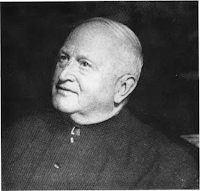Vocal Music
- The Seven Joys of Mary – arr. Richard Shepherd (1949 – 2021)
- I Will Not Leave You Comfortless – Everett Titcomb (1884-1968)
Instrumental Music
- Prière du Christ montant vers son Père – Olivier Messiaen (1908-1992)
- Sonata in G Major: Adagio – Josef Hector Fiocco (1703-1741)
- Prelude on "Deo Gracias" – Healey Willan (1880-1968)
Congregational Music (all hymns from The Hymnal 1982 with the exception of those marked “R” which are from Renew.)
- Hymn 494 Crown him with many crowns (DIADEMATA)
- Hymn 215 See the Conqueror mounts in triumph (IN BABILONE)
- Hymn 450 All hail the power of Jesus’ name! (CORONATION)
- Hymn R37 Father, we love you (GLORIFY YOUR NAME)
- Hymn 460 Alleluia! sing to Jesus! (HYFRYDOL)
- Psalm 68 – tone VIIc
Ascension Day commemorates the Ascension of Jesus into Heaven. Happening 40 days after Easter, on a Thursday, it is one of the ecumenical feasts of Christian churches, ranking with the feasts of Easter and Pentecost.
We don't hold a separate service on Ascension Day, but we do acknowledge it on the Sunday after the Ascension with hymns and readings. The first reading from Acts is the story of Christ's departure.
Prière du Christ montant vers son Père
 |
| Olivier Messiaen |
Our opening voluntary is that last movement, Prayer of Christ ascending to the Father. The subtitle is the words found in today's Gospel reading:
I have manifested Thy name unto men… And now I am no more in the world, but these are in the world, and I come to Thee. - John 17:6, 11
Messiaen is known for his unique composition style. Incorporating complex rhythms, harmony and melodies, Prière du Christ montant vers son Père is no exception to the composer's popular, distinctive style. The extremely languorous tempo of the movement sustains the intense religious character of this work.
The Seven Joys of Mary
The Seven Joys of Mary is a traditional carol that tells of Mary’s joy at different points in Jesus’s life, probably inspired by the trope of the Seven Joys of the Virgin in the devotional literature and art of Medieval Europe. Though oft now heard in Lessons and Carol Services in December, it was not traditionally associated with the Christmas season.
I chose to schedule it on this day because it ends with this stanza:
The next good joy that Mary had,It was the joy of seven;To see her own son, Jesus ChristTo wear the crown of heaven:
We believe Jesus now reigns in heaven, "that place where our Savior Christ has gone before; who lives and reigns with [God] and the Holy Spirit, one God, in glory everlasting." (Collect for Seventh Sunday of Easter: The Sunday after Ascension Day, BCP p. 226)
I Will Not Leave You Comfortless.
This short motet from the pen of American organist, composer, and church musician Everett Titcomb.
His music was very popular within the Anglican church, particularly the Episcopal Church, in the first half of the 20th century.
A product of New England, Titcomb's association with church music and the Anglican faith began as a child. Although his family was associated with the Unitarians, Everett was brought into the Episcopal church very early. Through the pervasive influence of a neighbor, he joined the boy choir of St. James' Episcopal Church in Amesbury at the age of nine. Singing in the boy choir was a part of his musical education until a changing voice led him in a new direction, playing the organ for Sunday School.
By the time he was fourteen, he had become parish organist at St. James'.
After high school he began working at at the Church of the Messiah in Auburndale, a suburb of Boston. After seven years in Auburndale, Titcomb knew he needed a change and by the fall of 1909 he had
accepted an appointment at Christ Church, Andover, Massachusetts. He moved to a new apartment which was also near the Church of St. John the Evangelist in Boston, and in 1910 he was hired as organist-choir master at the church. Titcomb would serve this parish for fifty years, and this little church would become within two decades a leader in the United States in the revival of plainsong and of Renaissance polyphony.
The motet is an ABA form and opens quietly with the tenor section chanting the theme that is immediately taken up by the rest of the choir entering on a G minor chord to establish the key. The first section is set in a syllabic, chordal style while the florid B section consist of an imitative setting of the word “alleluia.” This florid style is typical for hallelujahs going back to the medieval plain chant settings. The Basses sing the plain chant tune Veni Creator Spiritus while the rest of the choir sings alleluias.
 |
| Everett Titcomb |
Interesting note: Messiaen's Prière du Christ montant vers son Père and Titcomb's I Will Not Leave You were both written within two years of each other, but while Messiaen pushes the norms of harmony, rhythm and form, Titcomb reaches back to the music of the Renaissance. Both are still very much a part of sacred repertoire today.
No comments:
Post a Comment
Note: Only a member of this blog may post a comment.